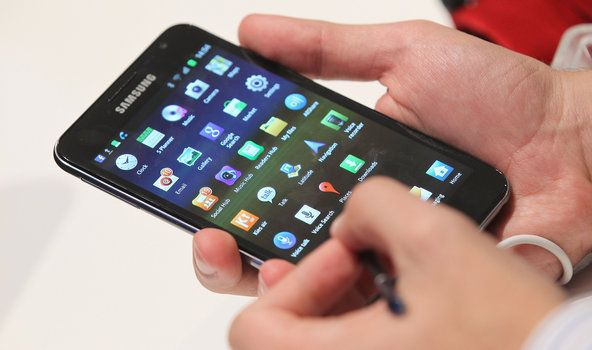 Sean Gallup/Getty ImagesThe Samsung Galaxy Note mini-tablet.
Sean Gallup/Getty ImagesThe Samsung Galaxy Note mini-tablet.
Samsung Electronics on Friday posted record fourth-quarter profits, citing high sales of its Android devices, while HTC, another major Android player, reported a drop in profits, its first decline in two years.
Samsung, based in Seoul, South Korea, said its profits increased 73 percent compared to 2010’s fourth quarter. It cited record-breaking sales of its smartphones, as well as the sale of its hard drive business to Seagate.
HTC, based in Taiwan, said profits decreased 26 percent compared to the year-ago fourth quarter, citing slower sales of its handsets.
Both companies have been aggressive advocates of Google’s Android operating system, and their differing performances illustrate the vast effort it takes to remain successful in the highly competitive mobile industry.
“I think what’s wicked cool about this is this is a perfect example of the velocity of mobile, of what’s happening in the mobile space,” said Michael Gartenberg, an analyst at Gartner, the technology research company. “It just goes to show how quickly things change in the market, how fast people need to innovate and how hard it is to innovate.”
HTC was the first company to make a big bet on Android. It released the G1, the first smartphone running Google’s operating system, in 2007. In the ensuing years, HTC continued to ride Google’s momentum, pumping out some of the most popular Android smartphones, like the Nexus One. The bet paid off: By 2009, HTC became the world’s fourth-largest maker of smartphones, after Nokia, Research in Motion and Apple.
Samsung waited until 2010 to make an aggressive play with Android, when it released its Galaxy S smartphone, which sold 10 million units in 10 months. Samsung rolled out more products under the Galaxy portfolio, including the Galaxy S II phone and the Galaxy Tab tablet. It threw as much as it could against the wall until some things stuck. And if some products were flops, Samsung could afford losses, given its size. For HTC, a smaller manufacturer, failures would be less forgiving.
While a dramatic change, HTC’s setback is probably related to the company’s lack of interesting innovation in the last year, said Will Stofega, an analyst at the International Data Corporation.
“It’s almost like a fashion market,” he said. “They’ve had some great devices, but they didn’t have that little sparkle or pizazz.”
Mr. Stofega added that Horace Luke, HTC’s chief innovation officer, resigned in April 2011 for personal reasons. That was a tremendous loss for the company because he had overseen some of the most successful designs, Mr. Stofega said.
Victory for Samsung, now the largest smartphone maker in the world, is hardly permanent in a market that changes so quickly, Mr. Gartenberg said. “Is it a long-term strategy, and will it pay off long term for them?” he said. “What do they need to keep up the current momentum in a market that can be very very fickle, and where fortunes literally change overnight?”
If you have thoughts on how to answer that question, post them in the comments section below.
Article source: http://feeds.nytimes.com/click.phdo?i=8f8ff794bf460f8c118a8a64c3e87cda
Speak Your Mind
You must be logged in to post a comment.